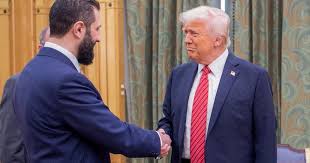In a dramatic shift from longstanding U.S. policy, President Donald Trump’s announcement from Riyadh that sanctions on Syria would be lifted has sent ripple effects across the region—particularly in neighboring Lebanon and Jordan. Both countries, deeply entangled with Syria through geography, commerce, energy, and refugee dynamics, now see the move as a potential economic and geopolitical turning point after years of strain and stagnation.
Reopening Pathways: What the Sanctions Relief Means
Since 2011, Lebanon and Jordan have borne the brunt of the war in Syria and the economic fallout of U.S. sanctions—most notably the 2020 Caesar Act, which penalized any entity engaged economically with Damascus. While intended to isolate the Assad regime and deter human rights abuses, these sanctions inadvertently strangled the economies of Syria’s neighbors, cutting off trade routes, stalling joint infrastructure projects, and limiting cross-border mobility.
President Trump’s declaration—delivered alongside Saudi Crown Prince Mohammed bin Salman and preceding his meeting with Syrian interim President Ahmad al-Sharaa—effectively repositions Washington’s role from enforcer of isolation to broker of reengagement. It also provides long-awaited cover for Arab states to formalize their outreach to Damascus.
Beirut’s Calculated Hopes
In Lebanon, the decision opens long-blocked channels for energy and trade. The much-delayed Arab Gas Pipeline project—which was to bring Egyptian gas to Lebanon via Jordan and Syria—may now resume, offering some relief to the country’s worsening electricity crisis. Moreover, the potential revival of Syrian–Lebanese transit trade promises to reinvigorate sectors like agriculture and manufacturing that rely on access to Gulf markets.
Politically, the lifting of sanctions may give Beirut the green light to recalibrate its diplomatic posture toward Damascus. Though ties remain politically fraught, especially among Lebanon’s divided factions, the combination of U.S. approval and Gulf endorsement could make a more pragmatic relationship possible—one that includes structured discussions on refugee repatriation and post-war reconstruction.
Amman’s Institutional Leap: A New Era of Cooperation
Jordan, for its part, has moved quickly to capitalize on the opening. On Sunday, the Jordanian Cabinet approved the establishment of a “Higher Coordination Council” with Syria—a groundbreaking institutional body co-chaired by the foreign ministers of both countries and comprising ministers from over ten strategic sectors, including energy, trade, transport, water, agriculture, health, ICT, education, and tourism.
The council will convene biannually, alternating between Amman and Damascus, with its first meeting scheduled to take place in Jordan. According to government sources, the inaugural session is expected to produce the most comprehensive bilateral agreement since Syrian independence in 1920. The council’s mission: to harmonize economic policies, resolve trade barriers, and foster joint initiatives on electricity connectivity, border logistics, public health, and digital infrastructure.
The move follows a statement from Jordan’s private sector leadership, including the head of the Chambers of Commerce, welcoming the sanctions relief as a historic opportunity. A major trade delegation is set to visit Damascus later this month in what’s being described as the launch of a “new economic era” between the two countries.
Economic Indicators Already Shifting
Trade data from the first quarter of 2025 reflect the potential scale of renewed Syrian–Jordanian commerce. Syria topped the list of Jordanian export destinations, with over 35 million dinars in goods shipped and a 40% year-on-year increase in industrial and agricultural product flows.
Jordanian industrial leaders report that longstanding barriers—imposed by the former Syrian regime—are now being dismantled under the transitional government. This is expected to further accelerate trade, facilitate cross-border mobility, and spur investor interest in both countries.
Cautious Optimism Amid Lingering Hurdles
Despite the positive momentum, challenges remain. European sanctions are still in place, and many international banks and companies remain wary of re-entering the Syrian market. Syria’s infrastructure remains in disrepair, and its current governance lacks a clearly articulated reform agenda that would attract large-scale foreign investment.
Still, analysts agree that U.S. political cover provides a critical psychological shift. It alleviates pressure on financial institutions and regional governments, enabling the activation of long-shelved initiatives and reviving bilateral and multilateral dialogues that had been frozen by a decade of punitive measures.
A Strategic Pivot or a Passing Gesture?
Whether this opening becomes a sustained pivot or a fleeting gesture will depend on how Syria and its neighbors manage the delicate balance between past grievances and future cooperation. For Lebanon and Jordan, both tethered to Syria by history and necessity, the lifting of sanctions is not merely symbolic—it’s a potential lifeline.
If wisely leveraged, the move could realign regional economic maps and restore Beirut and Amman to their traditional roles as gateways between the Levant and the Gulf. It also tests the region’s capacity to move beyond the legacies of conflict toward a more pragmatic and integrated future.
This article was translated and edited by The Syrian Observer. The Syrian Observer has not verified the content of this story. Responsibility for the information and views set out in this article lies entirely with the author.


